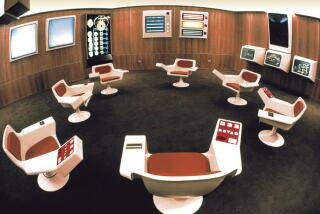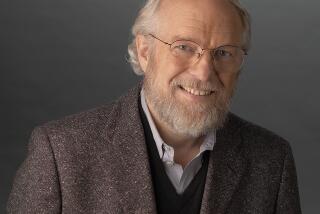Humble Start for the New Technology Called the Net
- Share via
You would be hard pressed to imagine a more humble beginning for an invention that is profoundly transforming all of commerce, communication and culture.
The Internet, and the close cousin that is the World Wide Web, has its roots in a handful of elite scientists and high-minded graduate students who, on a summer day in 1969, gathered at UCLA’s engineering building to install some computers that would help them conduct research. For all their collective genius, they could not foresee where their modest research feat would lead 30 years after the fact. Indeed, even e-mail surprised some of them as a useful application.
Now it seems that hardly a day goes by when we don’t achieve some Internet- or Web-related milestone.
In 1994, the year the federal government unleashed the Internet to the powers and persuasions of the free market, about 3 million people used the Net. Today, the number of Americans alone using this information autobahn is estimated to have surpassed the 100 million mark.
It took radio 38 years to reach 50 million U.S. homes and television 13 years. The Internet did it in just five.
What was the province of scientists and researchers just a few years ago, abounds today with all manner of ordinary consumers, entrepreneurs and even children. Today, you can go to the Web to get instant news updates, trade securities, order pizza, reserve a tee time, make hotel and plane reservations, apply for a job, do your banking, buy a car, attend virtual colleges; the list literally grows by the day.
Perhaps most telling for what lies ahead, the impressive capability of the technology behind the Web is said to be doubling every 12 months. So advanced is the speed and memory capacity of today’s personal computers that Net pioneer Leonard Kleinrock says “all you will ever say in your lifetime--50 years of talking 10 hours a day seven days a week--I can compress and put on one personal computer hard drive.”
And yet, says Kleinrock, “we are only in the equivalent of the Stone Age with the Web. We are just beginning to get past the beginning of the beginning.”
Kleinrock was there in the very beginning that summer day at UCLA. Today, he’s a professor of computer science at the school, and chairman and founder of an Internet start-up called Nomadix.
“The Internet,” he says, “is an uncontrollable global communications system; nobody can turn it off and nobody owns it. . . . It’s a movement of the first order.
“The only thing that will slow down the technology is people’s willingness to accept it.”
In his mind, one of the single greatest benefits of the Internet and its emerging technology has been its ability to spur communities to form and interact.
“It allows groups independent of their geography or wealth or standard of living to interact, exchange ideas, do commerce, tell jokes, research, form, grow, shrink and die,” Kleinrock says.
“Think about it--you have 200 million people adding their creative juices to this thing called the Internet.”
*
Yet, there has been a disturbing side to this as well--one that many Internet pioneers acknowledge they didn’t anticipate.
“There are things that are disappointing, that make me sad,” says Kleinrock. “The dark sides: There’s pornography, there’s the invasion of privacy, there’s hacking. The Internet exacerbates the dark side. You sit in your dark bedroom and you can reach out across the world and still maintain an enormous degree of anonymity and do bad things. . . . It’s hard to control any of that and there’s no silver bullet. The only solution is to educate your children.”
Like others, he also worries that underprivileged segments of society, particularly the children, will be hurt by lack of access to this potent medium.
“Young people in ghettos have to fight against poverty, crime, hunger and drugs; they’re not going to get on this bandwagon. It will not become part of their lives. And once they lose that ability at an early age to jump on, it’ll be hard to catch up with the kids who have been doing so since they were 2 and 3 years old.”
At the same time, most Web visionaries see almost boundless possibilities for beneficial change, especially in the fields of health care (“There will be an enormous capability to monitor patients and determine how they’re doing,” says Kleinrock) and commerce (Kleinrock: “How about a refrigerator that tells you what’s in the refrigerator and orders the food automatically?”).
To say nothing of the yet unforeseen, undreamed of beneficial applications, constrained only by the boundaries of society’s imagination and the depths of its goodwill.





